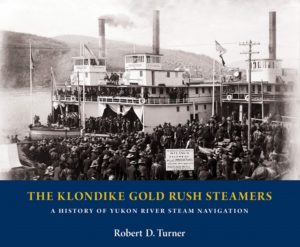Originally, I looked at Victoria author Robert Turner’s book The Klondike Gold Rush Steamers: A History of Yukon River Steam Navigation and thought, Of course they want me to write a review of a book about boats. Being in the Navy, I can’t get away from them. I looked dubiously at the book, as it weighs at least five pounds—it’s massive.
Not one to back down from a challenge, I agreed to review it. In fact, I imagined sitting out on the porch each morning, drinking a coffee, watching the sunrise, and reading a vibrant history of the gold-rush era.
And I did, for a while. The introduction alone brought me hurtling back in time to a different age, maybe a simpler time. The book is not focused on gold, but instead focuses on a specific mode of transportation: steamers. How picturesque—imagine sailing down the icy rivers to a mining town, full of adventure and hope of acquiring new riches. Even reading the diaries of workers and prospectors gave me shivers of longing.
But as I read, I hit a snag in the river—a rock bed, really, like a few of the steamers in the book, evidently. It didn’t stop me from reading, but it gave me a hard pause, because past the breathtaking pictures and minute details the author has collected, this book shows how our history in the late 1800s as settlers is just plain racist.
The European settlers, our ancestors, did things that we can’t take back. I’m not talking about the mining of gold, capitalizing on the use of steamers, or creating business in the Yukon. I mean the treatment of the First Nations, and it was not something to be proud of. It’s mentioned in this book, however vaguely.
I would have liked to have seen more information about the impact of the First Nations in the gold rush, delving into their work treatment as pilots and deckhands, maybe talking about the divisions of pay. I felt this left a hole in the book, maybe a chapter missing where this information could have been. Overall, the book was flawless, except this one part of our history we tend to hide from.

